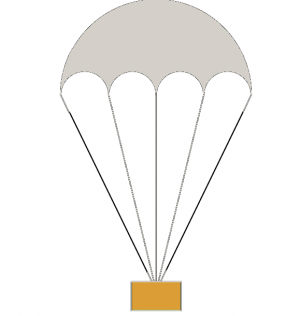Which material makes a good parachute
Lesson idea. A brief explanation of a simple investigation into parachutes and air resistance followed by some ideas for a possible investigation and a description of how to make a simple parachute.
Teaching approach. This activity supports a number of learning types:
- small group work(ta) - investigation conducted by small groups reporting back to the class.
- whole class(ta) dialogue(ta) - discussion of each situation open-ended questions(ta) – why did this happen? what do you think causes this movement?
- peer assessment(ta) – do peers agree?
- project work – linked in with the rest of the activities in this OER, topic work in design and technology, literacy, numeracy
- inquiry(ta)-based learning – initial presentation to the class can be framed as a problem for them to solve; co-enquiry – children working collaboratively
- arguing and reasoning(ta) – persuading each other about their explanations.
- exploring ideas – developing understanding of key scientific principles.
(edit)
| Resource details | |
| Title | Which material makes a good parachute? |
| Topic | [[Topics/Force|Force]] |
| Teaching approach | [[Teaching Approaches/Assessment|Assessment]], [[Teaching Approaches/Dialogue|Dialogue]], [[Teaching Approaches/Questioning|Questioning]], [[Teaching Approaches/Whole class|Whole class]], [[Teaching Approaches/Group work|Group work]], [[Teaching Approaches/Inquiry|Inquiry]], [[Teaching Approaches/Reasoning|Reasoning]] |
| Learning Objectives |
|
| Subject | [[Resources/Science|Science]] |
| Age of students / grade | [[Resources/Primary|Primary]]
|
| Related ORBIT Wiki Resources | |
| Files and resources to view and download |
|
| Acknowledgement | This resource was adapted from resources and original ideas contributed by Paul Warwick, at the Faculty of Education, University of Cambridge. |


